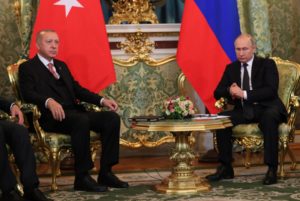Abdullah Bozkurt/Stockholm
A week after Russia launched its invasion of Ukraine, Turkey, the only NATO ally that declared its opposition to sanctions and kept its airspace open to Russian aircraft, granted more concessions to Moscow in a lucrative $20 billion contract for construction of the country’s first nuclear power plant.
On March 5 the Turkish Parliament approved a government-endorsed bill on a nuclear regulatory framework that authorized a number of concessions to Russia’s Atomstroyexport, a subsidiary of the Rosatom State Nuclear Energy Corporation.
The bill was submitted to parliament on February 24 by the ruling Justice and Development Party (AKP), whose chairman is President Recep Tayyip Erdoğan, and was fast tracked through two parliamentary committees — the Industry, Trade, Energy, Natural Resources, Information And Technology Committee as well as the Environment Committee — in four days. The general assembly voted to approve it on Saturday amid a flurry of criticism from the opposition parties.
It was poor timing to prioritize a nuclear energy bill that mainly involved Russia at a time when Russia was invading Ukraine and presented challenges to Turkey’s national security, trade and economy, said the main opposition Republican People’s Party (CHP) in its dissenting opinion attached to a report jointly issued by the parliamentary committees on March 1.
The English and Russian text of a 2010 agreement between Russia and Turkey on the construction of a nuclear power plant in Turkey:
That did not stop Erdoğan’s party from moving forward with the bill and refer it to the general assembly for deliberations on March 4 and 5. The government also did not bother consulting with civil society organizations and other stakeholders that have been working on nuclear energy and expressed serious concerns about building a nuclear power plant without full regard for the environmental implications.
“The irony of the matter is that the issue we are discussing [today] about the draft law is directly related to Russia, and Russia has now invaded Ukraine. … We give privileges to Russia, which the world has imposed sanctions on. What kind of a paradox is this? And after that, we say we stand with the Ukrainian people and that we are in solidarity with Ukraine. … Russia invaded Ukraine. This is a crime against humanity and the Ukrainian people. … The government of the Republic of Turkey should take a clear and unequivocal stance against it,” said opposition lawmaker Kemal Bülbül during the debate in the general assembly on March 5.

The bill defines the powers of the Nuclear Regulatory Authority (Nükleer Düzenleme Kurumu, NDK], the legal framework for the use of nuclear energy and the management of the waste and other matters involved with nuclear power. It is specifically designed to address management of the Akkuyu nuclear power plant, which is being built by Russia in Turkey’s south.
The agreement to build a 4,500-MW capacity nuclear power plant was signed between Turkey and Russia in 2010, with construction scheduled to begin in 2013. The first reactor of four is set to begin generating electricity in 2023. When it becomes fully operational, it will provide 10 percent of Turkey’s electricity requirements. Construction belatedly started in 2015 with an official ceremony amid protests by opposition groups.
The deal was criticized by the opposition, which stated that Turkey is already dependent on Russia for energy, especially gas, and that awarding the contract to build Turkey’s first nuclear power plant to Russia will increase that dependence. The contract granted Russia full control of the plant, from providing raw materials and handling the waste disposal to the management of the plant. That poses a national security risk to Turkey, according to the opposition.
The full text of Law No. 7381 on the Nuclear Regulatory Authority, which was approved by the Turkish Parliament on March 5, 2022:
The contract signed with Russia does not include a provision for technology transfer to Turkey and makes clear that the plant is owned by the Russians. It is also the most expensive electricity production in the country, according to the opposition, which stated that the Russians were provided a purchase guarantee of $0.12.35 to $0.15.33 per kilowatt-hour generated by the plant for the next 15 years. This is almost four times higher than the electricity generated by wind and solar energy resources, the opposition says.
The Erdoğan government publicly announced that it would not join the sanctions imposed on Russia by Turkey’s Western allies, saying it would act in line with its own national interests to protect trade and commercial ties with Russia. It also did not close its airspace to Russian aircraft.













